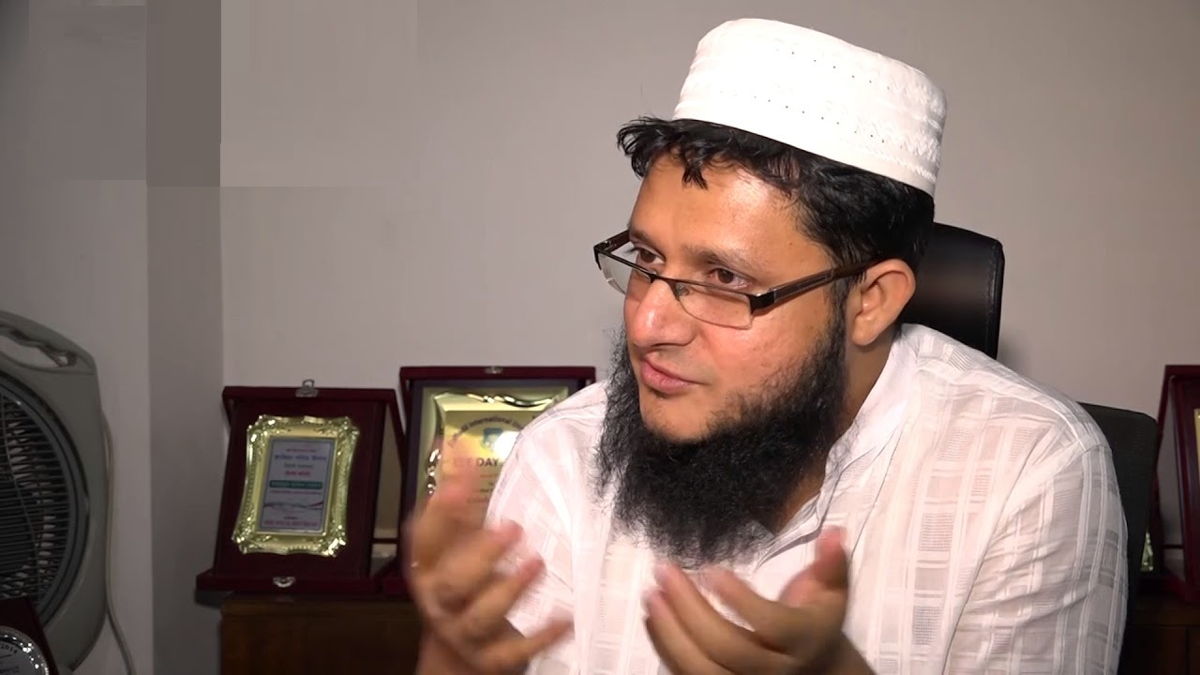
This story is the second and final part of a two-part series on the origin of Udvash, covering how Udavsh was created and the inspiration, motivation, and ambition behind the creation of Udvash. You may read part one here.
What follows is the final part of an interview we did with Udvash co-founder and Chairman of OnnoRokom Group Mahmudul Hasan Sohag on how Udvash was created. Please read part one here.
Udvash was born out of a passion. A passion for making a difference. Creating a movement of OnnoRokom Manush (different humans) and bringing about a change. When Udvash was founded in the latter part of 2000, its founders had no idea that it would take on a life of its own. After about 18 years, it has albeit taken a life of its own and turned into an educational institution like no other, pretty much uncomfortably without a definition for itself. A category of its own.
The beginning was humble. “We started Udvash with a mere 6,000 taka investment. We rented a small room at 800 taka rent per month. That’s how our journey began. It was quite difficult in the early days since we didn’t have adequate resources at our disposal. But we were passionate about teaching that helped us survive trials and tribulations of those difficult days.” That’s Mahmudul Hasan Sohag, Co-founder of Udvash and Co-founder and Chairman of OnnoRokom Group.
It took Udvash eight years to reach break-even. In those days, Udvash founders and team worked hard day and night and in most months did not get paid in full. What kept Udvash alive was love. Love for teaching. Love for students. And a strong sense of purpose. Throughout its journey, Udvash has been a purpose-driven organization. It has put the benefits of its students ahead of its own business or any other interest for that matter.
Today, Udvash has 42 branches. It teaches thousands of students every year. Creates opportunities for hundreds more in the form of part-time and full-time employment.
Udvash has created a new paradigm in the shadow education sector in Bangladesh. A paradigm that proposes a new and better approach to learning and teaching. That promotes understanding over rote memorization. Collaboration over mere competition. That promotes values like humility and honesty and helpfulness. A paradigm that says the purpose of education is much larger than achieving good grades. Education is about teaching how to live a good life and become OnnoRokom (different and better) Manus (human being).
It took Udvash 18 years to come where it is today. The journey was not smooth. Every node of those 18 years has crucial information and moving stories of struggles, sacrifices, trials, and triumphs.
This is the story of how Udvash was created and much more.
Our passion to build an educational institution that truly cared for students, that wanted to create OnnoRokom (different) human beings was stronger than our desire for riches and other career priorities. What motivated us at the time was the transformation we were seeing in our students, no matter how small they were in number.
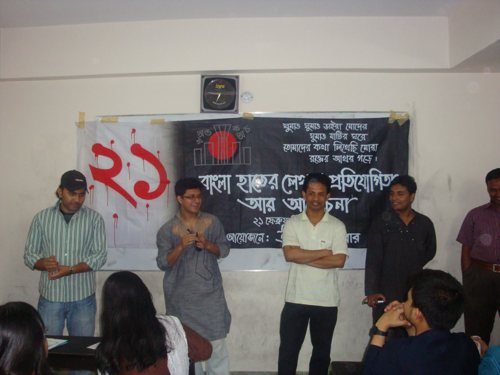
My admission procedure in BUET was completed by the end of November 2000. I was staying in a hostel with Hamid and a few other friends. There was a year-long session jam in BUET that year. So we had enough time at hand. In December of the same year, I and Hamid decided to teach students. That’s how Udvash began.
I invested 6000 taka that I had from tuition and other sources. I invested that money into Udvash. Hamid invested an equal amount. We rented a small room at Mohammadpur at 800 taka rent per month. That’s how our journey started. It was quite difficult in the early days since we didn’t have adequate resources at our disposal. But I was passionate about teaching. So were my partners.
We set up 3 benches in the room. As part of the promotion, we prepared some leaflets and distributed that in front of different schools. Later we did paintings with quotes of famous personalities to engage people. We managed to attract about 3 students in our first batch. However, I could not recall if they had made their payment.
Our fee at the time was BDT 700. It was way higher than what other coaching centers were asking for. We did not know that coaching centers usually charge BDT 200 to 300. After a long time, we came to know that information, which explains how much knowledge we had about coaching centers.
I used to take classes at Omeca Coaching Center at that time. I had a good relationship with the director of Omeca. He knew that we were trying Udvash and one day he told me that we could use a room at Omeca if we wanted to for Udvash since there were available rooms at Omeca. Since we were academic coaching, he also probably saw a benefit there to spread the name of Omeca.
As a result, after a year in Mohammadpur, we moved to Dhanmondi in a room of Omeca coaching center. We had a handful of students at that time but we were not in a position to hire paid teachers. So we decided to onboard a qualified partner. Liton was among the first few people we thought of as a potential partner.
Liton used to live in Hall and managed permission from Hall Authority to teach students at the hall. He was teaching around 20 to 30 students there. So one fine afternoon we proposed to Liton whether he would be interested in joining us as a partner. While discussing with Liton, his friend Majed was also there. Eventually, both Liton and Majed joined us as partners and thus we got teachers for each of the 4 subjects of science. However, in September of the same year, Hamid quit for some personal reasons and we then took Pavel (one of my BUET classmates) to fill the gap. We ran it together till 2006.
Dhanmondi was sort of an isolated location for us. We were missing out on a large number of students who usually operated around farmgate. So we decided to move to Farmgate. We eventually rented a room in Tejkunipara and moved there in 2002. That’s when our real struggle started. We did not have a sufficient number of students. As a result, there was always a working capital shortage.
Additionally, we had no idea if we were getting paid accurately since we had no accountant due to the capital shortage and all that. Our only employee then was Faruk bhai, who was working as a canteen boy at BUET at the time. He has been with us since then and today he looks after infrastructure development of our new outlet expansion.
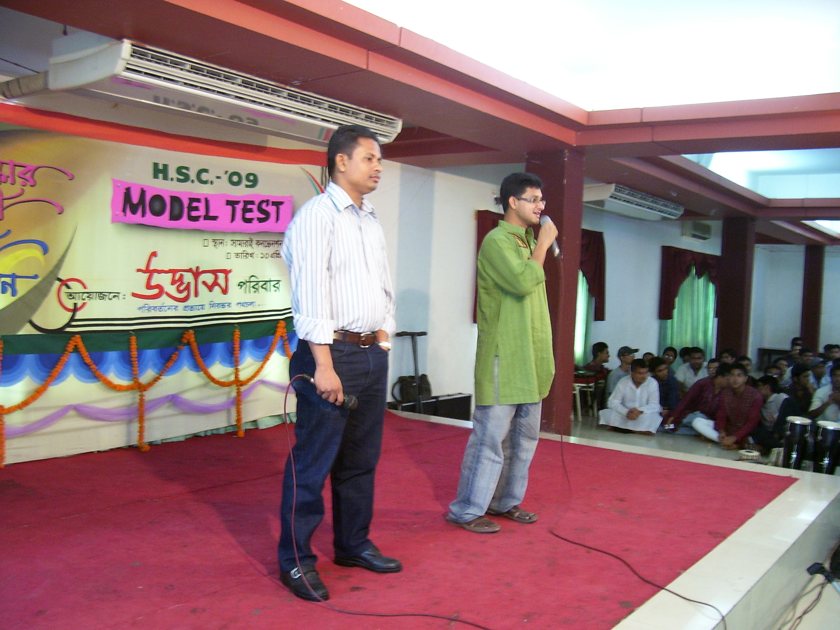
We did all kinds of things to ensure the sustainability of Udvash in the early days. We would hire a computer operator and offer him to stay with us in BUET hall to convince him to join us at lower pay. We would share our bed rotationally. Meanwhile, we decided to open a branch in Motijheel near Notre Dame College.
We scouted a few buildings and found one. We estimated that the building that we shortlisted wouldn’t be rented at less than 10,000 taka. It was too much for us which we could not afford at the time. But we went to meet with the owner, Yeamin Bhai who has been a great support to us since then to these days. After listening to our story, he proposed an unusual arrangement. He suggested we use half of the space and pay accordingly. The rent was 6,000, if I remember correctly, which was still a financial stretch for us. But Yeamin bhai encouraged us and told us that we could do it and that he would take care of the rest.
In the early days, we’ve invested a tremendous amount of resources in helping our students not only academically but also outside of studies. We helped them solve their personal problems. Listen to their issues. We became close to their parents. There are instances where we became part of their families. In general, we spent a tremendous amount of time with our students in class and outside of class.
After much thought, we decided to go with the arrangement. It was back in 2005 and we were getting a thin feeling of growth. We had already been able to attract a group of enthusiastic students from Notre Dame College by then. They spread the good name of Udvash which brought in a lot of new faces to our fledgling institution. Parents of the students also played the role of marketers for us. Slowly, we started to get more students purely through word of mouth.
However, our struggle was not done yet. For instance, there was a time when we could not pay rent for 8-months. Despite that, Yeamin was kind to us and he didn’t force us to leave the space. He used to like us very much and he helped us tremendously at that time. Instead of evicting us from his building, he loaned us 100,000 taka at the time. We offered him a partnership.
We were quite liberal about the partnership at that time :). He did not refuse but told us that he would see it later. We could feel that he was interested in Udvash. He also helped us in various other ways. We did not have an accountant at that time. We were not regular at collecting payments from students either. Many students would not pay for months because we never asked for fees from then.
Yeamin bhai helped us with an account. He realized that we do not have an accountant and are not getting paid accurately so he managed one for us. The accountant figured out that there were students that were studying for months and never paid a penny. The accountant worked with us for a while and helped us fix the situation. Later bhaiya did not show much interest in the partnership and instead told us to repay the loan whenever we could. He probably thought after receiving the report from the accountant that we’re a hopeless case :).
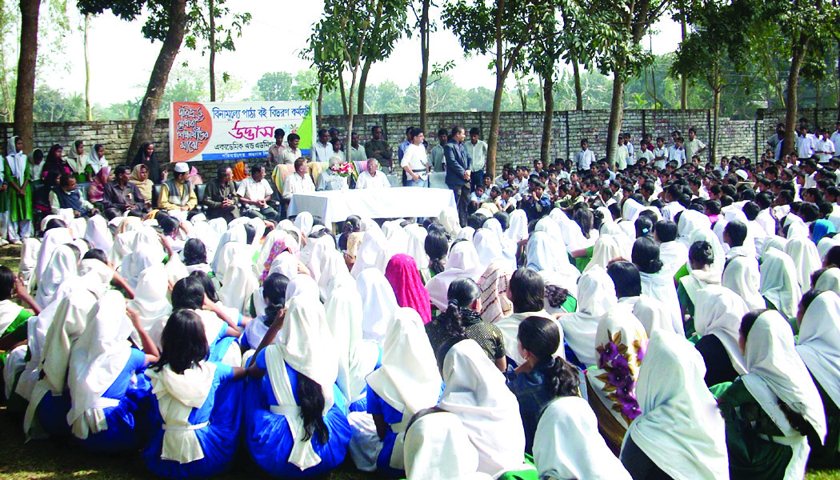
We were growing slowly at the time. The number of students used to fluctuate because most of the students used to ask for notes and suggestions which was strictly prohibited at Udvash since our motto was to make students understand what they are studying. Parents were equally confused when we would tell them that we don’t provide notes or anything. However, we persisted on that path and it paid off eventually.
We had an excellent cohort of teachers at the time who were not with us for money alone but because they were passionate about teaching and contributed a lot to making who we are. To these days, what makes Udvash different is our teacher. We hire the best teachers and ensure that they get all the supports to deliver the best education to their students.
Our first breakthrough came in 2005. Some of our students of the HSC’05 batch were true fans of Udvash. They worked as our brand ambassadors helping us to spread our names and bringing in new students. Then HSC’08 was a huge success for us. We managed to attract a good bunch of students. At one point, we became so popular among students that teachers at different schools started to take active measures to discourage students to come to us. While it was a momentary challenge for us, it did help us more than harming us. Students who did not know about us came to know more about our work through their teachers.
We had an excellent cohort of teachers at the time who were not with us for money alone but because they were passionate about teaching and contributed a lot to making who we are. What makes Udvash different is our teacher. We hire the best teachers and ensure that they get all the supports to deliver the best education to their students.
Udvash has created a new paradigm in shadow education sector in Bangladesh. A paradigm that proposes a new and better approach to learning and teaching. That promotes understanding over rote memorization. Collaboration over mere competition. That promotes values like humility and honesty and helpfulness. A paradigm that says the purpose of education is much larger than achieving good grades. Education is about teaching how to live a good life and become OnnoRokom (different and better) Manus (human being).
In the early days, we’ve invested a tremendous amount of resources in helping our students not only academically but also outside of studies. We helped them solve their personal problems. Listen to their issues. We became close to their parents. There are instances where we became part of their families. In general, we spent a tremendous amount of time with our students in class and outside of class.
In 2008, we first published our magazine Nirantar, the first of its kind by an educational institution like ours. We introduced debates, several clubs, and many other extracurricular activities at Udvash.
The teacher-student bonding has always been strong at Udvash. We mostly stayed at the top of the invitation list of our students’ family events. This is what made us go on despite all these challenges and the financial crisis.
Five years after the inception, when circumstances became even more fraught with challenges, two of our patterns quit their Udvash partnership and decided to stay with us as teachers. It was a logical decision on their part. We were about to graduate from BUET and Udvash was not showing any sign of going anywhere soon. They had to attend the call of reality. But Liton and I were determined to see it through to the end. This was not a logical decision; then and again, we could’ve never made it this far if we looked at the money.
This is exactly why I say that you can’t make an enterprise sustainable in the long run if you’re in the game only for the money. Doggedly pursuing Udvash, at that time, was an illogical decision in terms of money and everything. But we were not concerned about it.
Our passion to build an educational institution that truly cared for students, that wanted to create OnnoRokom (different) human beings was stronger than our desire for riches and other career priorities. What motivated us at the time was the transformation we were seeing in our students, no matter how small they were in number.
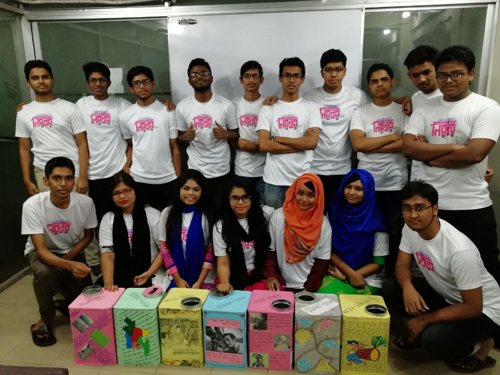
First and foremost, we are here for our students. We only do those things that are good for our students. That helps them do well not only academically but also in life.
As I stated earlier, our ambition, our reason for being as an organization is very different. We live for a greater cause than ourselves.
In more practical terms, Udvash isn’t merely a coaching center, as people might say. We have tried to introduce a completely different stream of academic care against the traditional coaching centers. When others distribute hand-notes and advertise shortcuts, we focus on imparting proper education to the students who came to us. Not only that we do not give any suggestions or hand notes to our students, we actively discourage it.
In fact, in the early days, we had to face difficulties in attracting students for that because parents would come and ask us what are the facilities we provide, do we provide suggestions and notes and we would reply that we don’t. That was a deal-breaker for many parents. But for many, it was the answer they were looking for. We discourage rote memorization without understanding a topic. We do take many model tests and write long feedback in the exam papers while returning them to students.
Our ambition at Udvash is to help create OnnoRokom Manush. So teaching moral principles is something that we take seriously. But we don’t merely ask our students to become moral beings and all that. We try to show them how to become one. For example, when we started OnnoRokom Pathshala, we provided our students' video lessons of lectures for free. When we were distributing the recording, we gave them a condition that they have to share the recording with as many students as possible.
We always encourage our students to help people. We encourage collaboration instead of mere competition. We encourage humility and humanity.
As founders, Liton and I have never shown any superiority. We never even had a separate room in any one of Udvash branches. We never wait for our employees to do things rather we do it if we have time. We involve our employees in every celebration. We never treat our people as employees. There is no boss and subordinates. It is a culture where everyone respects everyone regardless of their position.
In 2008, we first published our magazine Nirantar, first of its kind by an educational institution like ours. We introduced debates, several clubs, and many other extracurricular activities at Udvash.
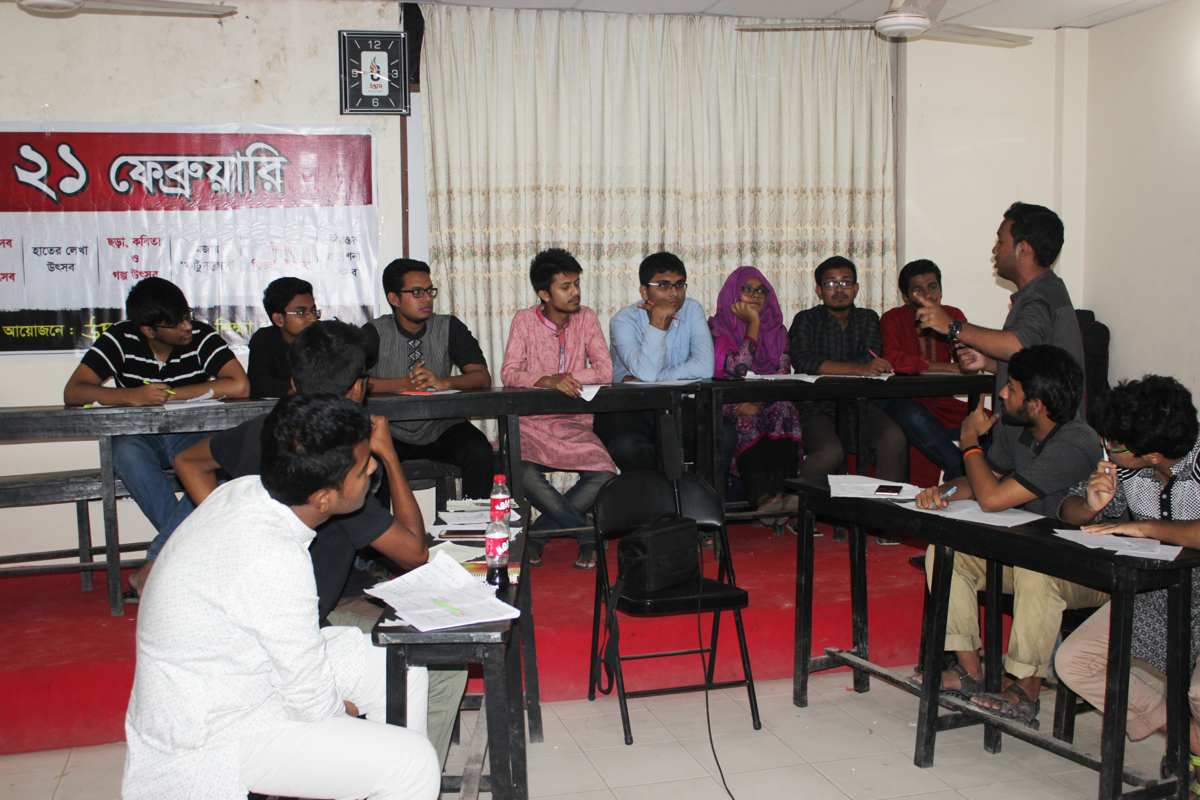
As I mentioned earlier, money has never been a motivation for us at Udvash. We have a student aid program that supports students with financial needs. When we first introduced it, we did not have a process. We used to offer financial aid to anyone who came to us and convinced us. Now we have a process. We also take a commitment from the students who receive the aid that they would give back at least an equal amount of contribution when they become capable and our CSR department now keeps track and follow-up with these students. We have a lot of extracurricular activities at Udvash like debate, magazine publishing, and many more. These are unlikely things to do for a coaching center.
The first and foremost, we are here for our students. We do things that are good for our students and help them to do well not only academically but also in life. As I stated earlier, our ambition, our reason for being as an organization is very different. We live for a greater cause than ourselves.
(This is the second and final installment of an interview we did with Udvash co-founder and Chairman of OnnoRokom Group Mahmudul Hasan Sohag on how Udvash was created. You may read part one here.)
(Disclosure: This is a branded content prepared in collaboration with the Udvash Communication team.)
